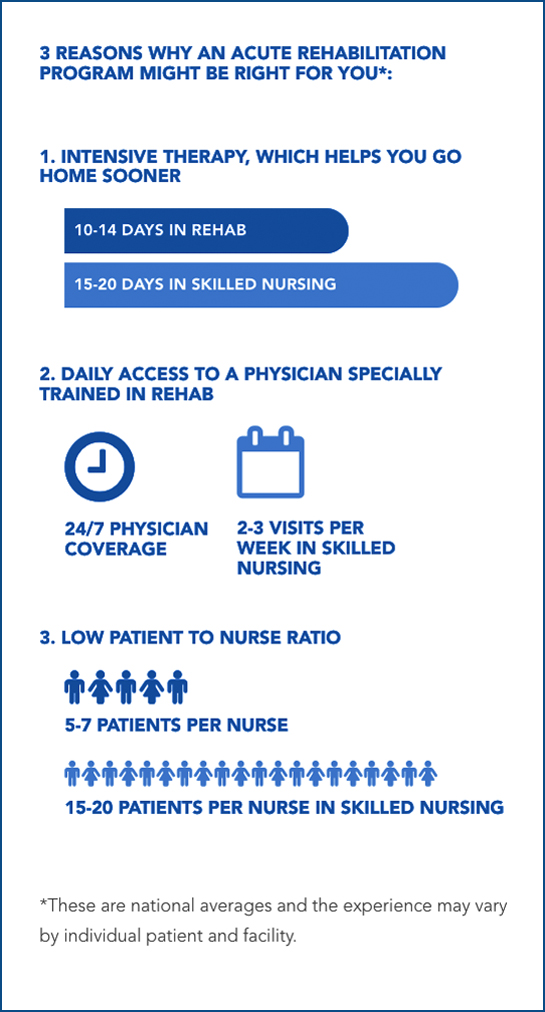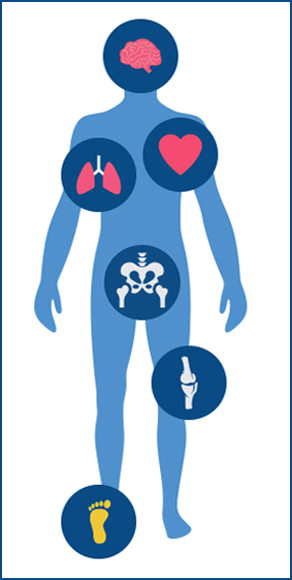Why Inpatient Rehab?
When your goals are getting home quickly and achieving the best recovery possible, it matters where you receive your rehabilitation therapy. That's why your doctor has recommended inpatient rehabilitation, also known as acute inpatient rehabilitation, as the next step in your recovery plan. So what exactly is inpatient rehab, and why is it the right choice for you?

Inpatient rehabilitation helps people who have experience the debilitating effects of an acute injury, impairment, or illness. The goal is to help each individual function as independently as possible through specialized treatment programs for conditions including stroke, brain injury, spinal cord injury, neurological conditions, amputation, and trauma.
Inpatient rehabilitation therapy can be an important next step for you or your loved one. The information on this page will give you a better understanding of inpatient rehabilitation and why it might be right for you.
We know that making the decision about where you receive your next level
of care can be confusing – especially with so many different options
to consider. When you choose inpatient rehabilitation you will be cared
for by a team that understands your individual situation and shares the
same goals you do –
getting you home as healthy, safely, and
as quickly as possible.
Before getting started, you probably have a number of questions about inpatient rehabilitation options, including:
- What level of personal attention will I receive from therapists, nurses, and doctors?
- What is the success rate of the program and what medical conditions are they best at treating?
- How quickly can I get back home?
Acute inpatient rehabilitation means a team that understands your individual situation and is dedicated to helping you recover will care for you. Patients treated with inpatient rehabilitation have been shown to receive a higher level of care and achieve better results versus other types of rehabilitation programs. For example:
- Inpatient rehab patients go home sooner
- They have greater success walking independently again
- They receive more time and attention by doctors and nurses, including regular visits by their doctor
- They have lower rates of readmission to the hospital during or after treatment
Types of Patients We Treat
While our patients have a wide variety of diagnoses, ranging from neurological conditions such as stroke and Parkinson's, to pulmonary conditions such as COPD, our inpatient rehabilitation unit stands out as an excellent treatment option because we create a custom rehabilitation program based on each patient's condition and goals.

You may be a good candidate for admission into our inpatient rehabilitation program if you have had a decrease in your ability to function in your normal environment and you have experienced one or more of the following:
- Brain injury
- Cardiovascular or pulmonary issues
- Hip or femur fractures
- Lower extremity amputation
- Major multiple trauma
- Stroke
- Total hip replacement
- Total knee replacement
- Neurological conditions such as motor neuron diseases, multiple schlerosis, muscular dystrophy, myopathy, Parkinson's disease, polyneuropathy
- Other medical and debilitating conditions
Your individual situation requires a treatment plan designed just for you. If you have been diagnosed with any of the conditions listed above, inpatient rehabilitation may be the best option for you to reach your goals and return home as soon as possible.
Will Health Insurance Cover Rehab?
Our program accepts most major health insurance carriers, including Medicare. In some cases, payment may be available through Workers’ Compensation. Our team of insurance experts will help you confirm your coverage and will work with your insurance provider to find out if it covers inpatient rehabilitation services.

How To Get Started
Once you and your doctor have made the decision that you need rehabilitation care, a Clinical Liaison from the Valley Rehabilitation Center at Valley Presbyterian Hospital will help you understand what program is right for you.
He or she will also talk to your doctor or case manager, review your chart,
and speak with you and your family to understand your current situation and goals, and to help make your transition to rehab as smooth as possible.
